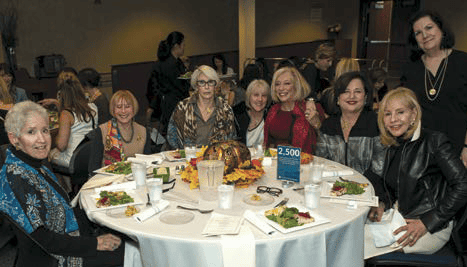The Women’s Cabinet held its annual Lion-Tikva-Chai luncheon to thank women donors giving at the $1,800 level and greater. Stephanie Calliott welcomed the women and gave a brief and positive campaign update, thanking the donors who had already made their commitments (and the campaign workers who’d made the ask) and reminded the women in the room that with 500 women donors still out there, a great opportunity exists to see the best year ever.
Past Chair Jodi Klebanoff welcomed 19 new milestone givers to the campaign (women who had reached the levels of Lion ($5,000+), Tikva ($3,600+); and Chai ($1,800+) since last year’s luncheon. (See box for a list of new milestone women donors in the 2017 campaign).
Janet Mercadante, Cabinet vice chair, welcomed the newest Endowed Lions of Judah (women who have set up a Fund to ensure that their Lion-level gifts benefit the community in perpetuity). Mercadante also recalled Endowed Lions of blessed memory, reciting their names—allowing those in the room to honor the memory of an inspiring group of women leaders. Mercadante then introduced the guest speaker for the luncheon, Sheila Katz, Hillel International’s youngest vice president and its first vice president for social entrepreneurship.
In her role with Hillel, Sheila Katz (who appears young enough to be a Hillel student) works to find creative new ways of engaging Jewish students on campus, especially those on the “periphery of Jewish life,” she says. “…Students who have little to no connection with their Judaism, but who arrive on campus ready to explore.”
To attract these students, Hillel has had to invent and re-invent itself over the years. As a result, it’s become one of the largest and strongest student organizations in the country—often finding itself at the table (in the White House and elsewhere) in discussions on improving education, standards and student life. To achieve these results, Hillel realized some time ago that it needed to better understand who its students were, where they came from, and what were they seeking. It needed data—to measure, to analyze and to lead them to the kinds of programs and services it could provide.
The data collected allowed Hillel to meet the needs of students on various campuses across America. And it began to show trends which indicated a changing face of today’s college students.
In a powerful presentation of statistics and anecdotal stories, Katz described today’s Jewish students on campus. She talked about the challenges facing both students and the organization itself. Twenty percent of incoming Jewish college freshman today identify themselves as “Jews of color.” Twenty percent of all students come to campus with some declared “disability.” These can include physical disabilities, learning disabilities, mental, emotional or other disabilities. This is a national statistic, and Jewish students are included within it at the same rate.
What does this mean for students? It means that when they come to campus, they are faced with a variety of challenges. Not only must they decide which classes to take and consider declaring a major… And not only are they bombarded with messages from anti-Israel and BDS movement organizations, cloaked in names like “Students for Justice in Palestine…” (Who doesn’t want Justice?)… Today’s students grapple with the decision about where they belong. Is it Hillel? Is it the Asian Student Union? Is it the African American Student group? Is it all three?
Hillel is continuously exploring and developing new programs to serve the changing needs of students. Realizing that not all students will come to Hillel for programs, Hillel has begun taking its programs “out of the House” and literally “meeting students where they’re at.” Hillel has become a leader in “Public Space Judaism,” with Israel programs taking place in Student Centers, and Sukkahs being built “on the quad” or on the drill field (in the case of Virginia Tech). Hillel is also engaging students in small groups and in one-on-one coffee dates. In fact, they are teaching students how to engage one another. Hillel is also bringing Jewish and non-Jewish students together to allow all who are interested to learn more about Judaism, Jewish life and Israel.
The changing face of Jewish students on campus has meant changing the face of Hillel. Those organization changes are keeping Hillel relevant and resonant in students’ lives. Meanwhile, Hillel remains a safe space for students in an often confusing world; a resource for making the case for Israel; and most recently a place to learn how to engage with and dialogue with one another—not on Facebook, Twitter, or Instagram…but rather in person, face-to-face, over a cup of coffee and a bagel.
Katz closed her remarks with a thank you to the women in the room and to the Federations across the country who fund Hillel through annual allocations, and ensure that it remains strong into the future.
A portion of every donation made to the UJFT’s Annual Campaign provides funds which directly help Hillel continue to make an impact on students’ lives at UVA, Virginia Tech, George Mason University, The College of William & Mary, and Old Dominion University.
– Amy Zelenka, UJFT women’s campaign director

